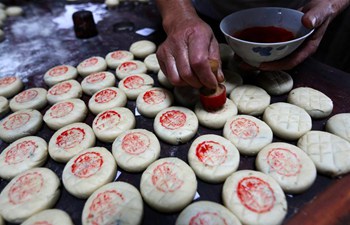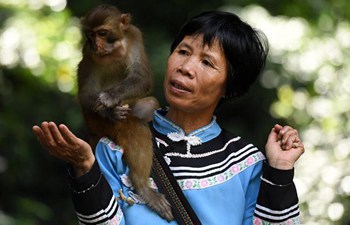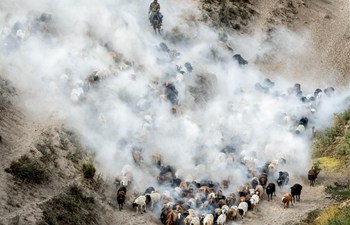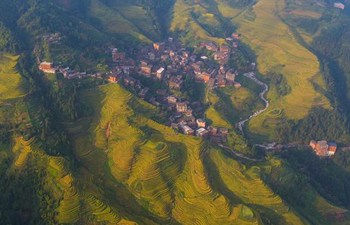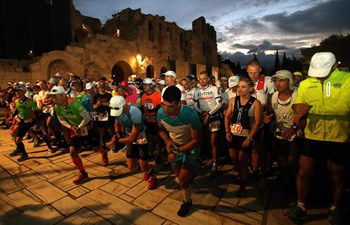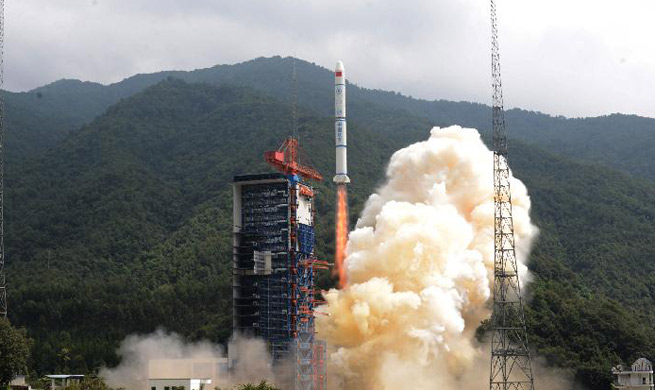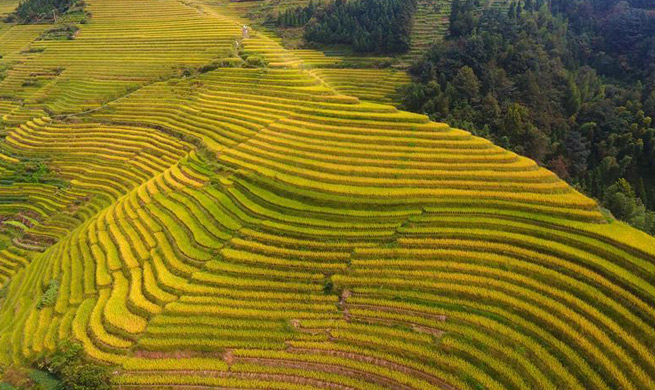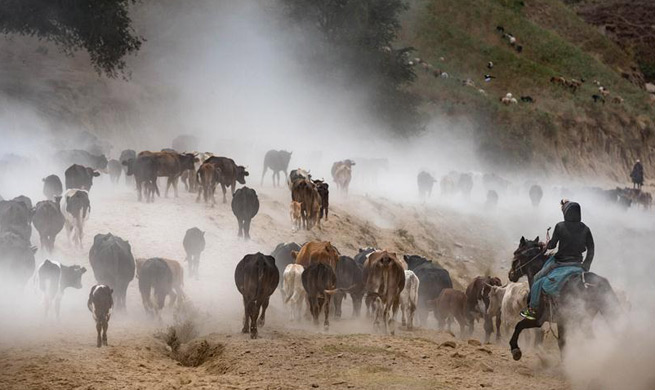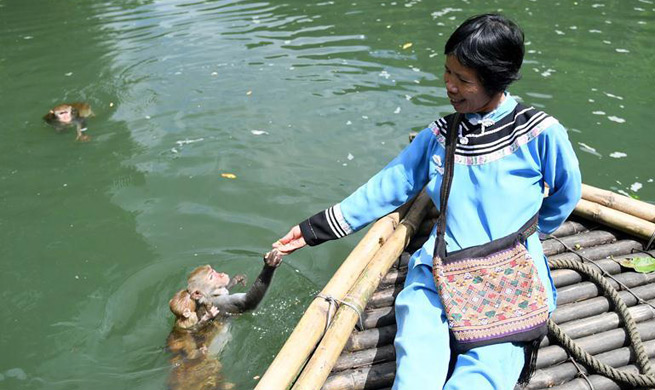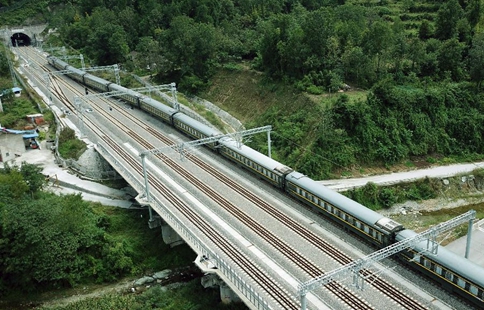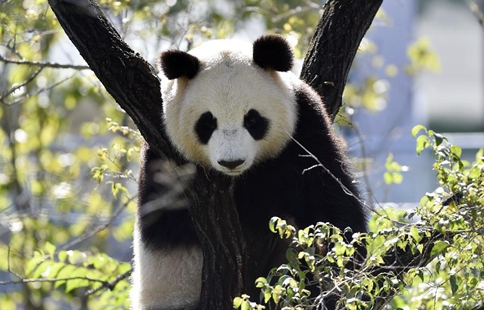by Burak Akinci
ANKARA, Sept. 29 (Xinhua) -- Turkey continues to rattle sabers after the independence referendum in neighboring Iraq's Kurdistan, but its response could be limited because of its strong economic links with the Kurdish region.
Iraq and Turkey held an unprecedented joint military drill on their border on Monday, just ahead of the controversial referendum. The exercises, involving tanks and armored vehicles, continued on Friday.
Turkish Prime Minister Binali Yildirim announced on Friday that all flights from Turkey to Erbil, capital city of the Kurdish region in northern Iraq, and Sulaymaniyah would be suspended indefinitely from Friday.
Meanwhile, Turkish Foreign Ministry issued a notice barring representatives of the Kurdistan Regional Government (KRG) from returning to Turkey.
In defiance of the warnings from the Iraqi central government, as well as Turkey, Iran, and even the United States, the semi-autonomous Kurdish region held a referendum for independence on Monday.
As expected, the final results showed the overwhelming majority of voters, or 92.73 percent, support the independence of the Kurdish region from Iraq.
Turkey strongly opposes the referendum, fearing that this would encourage its 14 million Kurds to seek autonomy in addition to the ongoing Kurdish insurgency inside the country.
Turkish President Recep Tayyip Erdogan has threatened to close the Habur border gate and block Kurdish authorities from exporting oil to Turkey, a very lucrative business for both Ankara and the Kurdish region.
"Northern Iraq is playing with fire," Erdogan said on Thursday, lashing out at the Kurdish leadership for insisting on holding the referendum.
He also threatened to take punitive measures against the Kurdish region in Iraq.
Good relations with Turkey is key to the economy of the landlocked Kurdistan region, which exports oil through a pipeline connecting the region with Turkey.
In the first half of 2017, trade volume between Turkey and Kurdistan reached 5 billion U.S. dollars, mainly via the Habur border gate, a 20 percent increase year-on-year.
In his remarks to the Turkish press on Thursday, Kurdish Prime Minister Nechirvan Barzani conceded that Turkey's sanctions would harrow the economic situation of the Kurdish people in Iraq.
"There will be problems. It will definitely have a (negative) impact," he told Daily Sabah.
During the last decade, Turkish companies have been helping the Kurdish government build some of its infrastructure, including an airport in Erbil.
According to the Turkish Economy Ministry, some 1,300 Turkish companies operate within the Kurdish region, while the region's debts to Turkish firms have amounted to 1.8 billion dollars.
"Turkey is obviously angry that (Kurdish President Masoud) Barzani has not listened to warnings not to organize the referendum, but now it's done and a secession is not for tomorrow, so Ankara will return gradually to a more rational and realistic attitude," a western diplomat who asked to remain anonymous, told Xinhua.
Turkey has vast interests in the Kurdish region and needs also its help to combat the Kurdistan Workers' Party (PKK), the Kurdish separatist forces in Turkey, he said.
"We would expect Turkey to continue to affirm it's opposition to the independence vote publicly, but on the other hand, not to take decisions that would harm its own interests," the diplomat said.
However, imposing economic sanctions remains the best option for Turkey to respond to the controversial vote by isolating the Kurdish region, local experts said.
"How does the KRG think that it will survive without its main income which is oil exports (from Turkey to the west)," said Can Acun, a researcher at the Foundation for Political Economic and Social Research, a pro-government think-tank based in Ankara.
He concluded that Turkey could eventually sacrifice its interests in KRG to prevent the establishment of a Kurdish state that would engulf the region in conflict and trigger a domino effect.
Some Turkish analysts predicted that Turkey can go further to intervene militarily to safeguard the rights of the Turkmen minority living in Kirkuk, one of the contentious cities located in northern Iraq.
"As President Erdogan is pursuing a nationalist agenda to build support in the run-up to the 2019 (presidential) elections, he may decide to intervene on behalf of the Turkmens in a nationalist campaign should the future of Kirkuk under the KRG come into question," Soner Cagaptay, a senior fellow at the Washington Institute for Near East Policy, told Xinhua.
As the largest stateless community in the Middle East, there are about 35 million ethnic Kurds living in Turkey, Iraq, Iran and Syria.
In Turkey, which hosts the majority of Kurds, the PKK has been engaged in an armed campaign for autonomy since 1984, which has led to more than 40,000 deaths.





